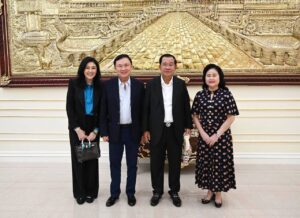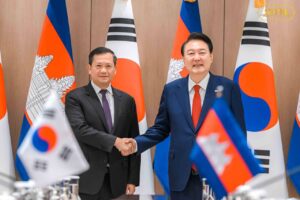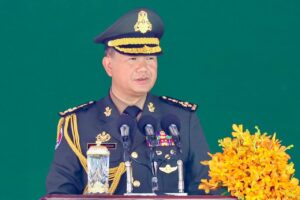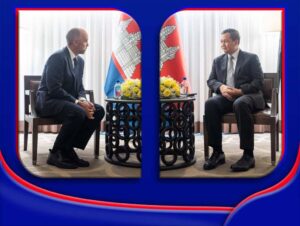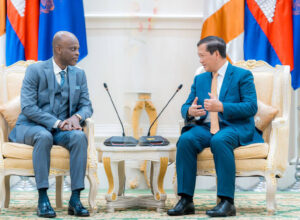[Start of Comment 1]
(1) The National Police has many roles and responsibilities
As His Excellency General Ek Monosen read out recently, the National Police Force has many skills. The National Police has many roles and responsibilities. The military’s duties are limited, but for the police force, there are many specialized roles, including border protection. There are justice officers, immigration, and identification police officers who are tasked with border expertise and providing direct services to citizens, for which training human resources (to do these tasks) is necessary (and) important. In this regard, I would like to thank the efforts of the National Police, the Chief of Police, Deputy Chief of Police, and police officers at all local levels who strive to fulfill their duties, participate in protecting territorial sovereignty, maintaining relations with neighboring countries, serving the citizens, maintaining peace, security, and stability, as well as providing essential services at the grassroots level, from the police station to the higher levels […]
(2) The national police force is performing the core task is law enforcement
Sometimes, due to some small shortcomings, like the traffic police, some people protested. If it was such a discontent, should we remove the traffic police from Phnom Penh for a day (we would have seen how messy it would be). Do you feel secured? The traffic police perform their duties, in the sun or rain, and sometimes have other (additional) tasks. Of course, it is not perfect. However, the dedication and performance of the national police force (stands out) as an important role in serving (the people). The (Royal) Military Police follows behind. In some places, working to enforce the law altogether, but the core task (is performed by) the national police force (of all types), whether it is traffic, other public order, or providing services in villages and communes. I would like to take this opportunity to thank (on behalf of) the government to the (forces) throughout the country.
(3) Armed forces cooperate to defend the territory when there is a threat of invasion
Yesterday, I went to a meeting to prepare the front lines to (be ready in case of) fighting to defend the territorial integrity, and our national police were also present. There are four small divisions in the direction of Preah Vihear, which stand shoulder to shoulder with the army to protect the territorial integrity. His Excellency the Commissioner-General of the National Police also went there at that time. (Both the police and the army) think the same way, to protect (the territorial integrity), without any discrimination. This shows the spirit of cooperation of the armed forces in defending the territory on behalf of the Khmer people when there is a threat of invasion.
The implementation of the government’s policy is the same. A little later, I will talk about issues relating to Thailand. They (caused a problem) creating a headache for the immigrations. Today, coordination is going on. Thailand detained two Cambodians. This morning, one was allowed to come out. In the evening, they coordinated another. One of the Cambodian women was heard and seen shouting in Thai last night. She (wanted to cross the border to Cambodia) but Thailand did not let her. They used the excuse that she did not have proper documents, so Thailand detained her. Now we are working on that. (This is) a direct challenge (that requires effort to solve the problems) […]
(4) The police must be trained in hard skills to provide services in all professions
Building the capacity of the (police) force that performs tasks with every profession is important. Firstly, (the force has) hard skills, meaning that all services are provided, whether it is public order services, immigration, border skills, cyber identification, in which human resource training (for) taking up this role and responsibilities is important. When talking about human resource training, the main actor is the school. If we talk about the school, the main actor is the professors and the management, who play an important role as a training center. We also have regional schools, but the Royal Police Academy plays an important role in training police officers.
Police officers are the main backbone, especially the middle level, the bridge between senior management and operational officers, police officers, and deputy police officers. (In this regard, we) need police officers to lead. Clarity (in the police profession) depends on the quality of the school. I am grateful and appreciative of the achievements that the Police Academy has made in the past, both under the leadership of HE Seng Phally and now under the leadership of HE Ek Monosen. Thank you for the dedicated efforts from Samdech Kralahom Sar Kheng to HE Abhisante Bandit (Sar Sokha) who continues to promote the capacity building of our police force.
(5) The police must be trained in soft skills, namely professional ethics, understanding the law, and being flexible but firm
The second training is the soft skills (which is training) in professional ethics […] (For) the National Police (training in professional ethics is necessary, because they) not only (have the role and duties) to implement (the function) against criminals, but also (provide) daily services to the people. So, the decision(s) must be made with a good understanding of the law. We, as law enforcement officers, firstly, must clearly understand the law, ethics, and professionalism (in performing our duties). Now, in the era of Facebook, whether in Cambodia or in the United States, improper actions could have been recorded and posted immediately (for public eyes). So, we must be clear. Secondly, what is the purpose of enforcing the law/ethics? The law already exists, but sometimes the enforcement must be flexible, gentle, but firm. I often mentioned about two cars that were speeding. The first car just wanted to show off his sports car status and speed. The other car was rushing his wife to the hospital for baby delivery. Both were speeding about the same. How should officials act?
(6) Police officers must make decisions based on ethics and reasoning, applying the law, while being flexible in handling situations
Officers must make decisions based on ethics, professional training, and situation assessment. When to stop, when to give instructions, when to provide additional assistance to avoid accidents. If the person has a wife (in an emergency situation), sometimes a police car or motorcycle is needed to lead the way. Therefore, it is required that each law enforcement officer has/understands this ethics and reasoning. Sometimes, when an emergency car comes, the police officer in front must make a decision immediately. Should he let it go or not, or wait and call the superior (who) cannot be reached? He must make a decision. If waited a little longer, there could be danger happening. Yesterday, there was a report that one of our Cambodians died at the border because the Thai side did not allow the person in (emergency case).
The Thai side did not open the border crossing because their superiors said (to allow entry only) for emergencies. We allowed the person to cross, but the Thais did not implement it. Maybe they were waiting for order from their superior. In such case, the one present on the spot has to make quick decisions (based on ethics and reasoning) because each position usually has at least one team leader who is managing. So, this soft and hard thinking is important for law enforcement officers. Sometimes we don’t have time to ask for a higher authority’s decision. We need to have the right to make judgments. We still enforce the law, but we need to be flexible to deal with the situation. Strengthening soft and hard knowledge for officers is important. Congratulations to all of you who graduated today.
(7) Offering support to software reform, including study materials, regularly updating teachers on security-related skills
In school, it is one thing, but when we go out (to perform duties), we must adapt to the actual situation. The main thing is that the school must have a clear foundation. It doesn’t matter which province s/he goes to work in, but when s/he first leaves, s/he goes from civil to police, and after 4 years, it means that the operating standards are the same. When s/he goes to work in a province, s/he may change according to that place, but the legal language is the same. It’s not possible for Banteay Meanchey to have this law or Battambang to have that law. Our country is not as big as the United States, which has an independent state […] there are rules […] of various operations that we can work together.
I would like to support schooling according to rules, preparation of documents and equipment, modernization and reform. Software reform, including study materials, regularly updating teachers, especially changes in security-related skills. Twenty years ago, criminals did not use online attacks. Now, there are many online cyberattacks. Yesterday at 10 o’clock, there was an attack on this and that institutions. Sometimes, various things, cyber skills, etc., need to be updated regularly. Now, when things turn into Cyber AI, the law needs to be changed and the training of law enforcement officers needs to be accelerated accordingly. Otherwise, we are not updated.
For example, in the past, we did not have AI. We had counterterrorism. In counterterrorism, according to the law, if we detain a person, normally we could keep the person only for 48 hours, after that we have to send him to court. But if there is no charge, we have to release him. So, the question is, if releasing him while the investigation has not (found the real reason), (we may not be sure if) s/he did not (go) bomb and (cause) danger to the people. So, it requires a change in the law that allows, in special cases, a (consideration of the period of detention) […] law enforcement officers need to understand this.
(8) As criminal networks is transnational, our police force need to understand international law to work with INTERPOL
About the current state of AI, we are preparing a Cyber Security Law. When it comes to implementation, we need to train and update the lessons so that officials know what to do, where to cross the border, and cooperate with each other. This is just one example. Criminal networks used to be only within the country. Now they are transnational. In Asia Pacific, the UN showed the network that is interconnected with Europe. The drug network is interconnected. So, working with INTERPOL, you need to be able to understand international law. We need to continue to do training in schools, as well as additional updates at the institution and training with partners.
(In this spirit) I support regular reform and updating (programs/learning materials), especially updating human resources (in the police force). We cannot use laws that are ten or twenty years old that do not cover AI. We do not know how to cover it. (Training and updating) is required. For the army, it is not so much of a problem because the operation would suffice just to have the change of technology and tactics, and not much in terms of implementation. For the justice police officers, especially our national police, (there is a need). So, the modernization, the adjustment of this content, I agree and support and please continue to pay attention to this work.
…..
[Start of Comment 2]
(9) Cambodia is not playing and/or joking about border crossings like Thailand
On June 24, 2025, I was in Samrong, meeting with the army and leaders. There were reports that the Prime Minister of Thailand had come out and announced that the reason (that Thailand had closed the border) was because the UN said that “Cambodia is an online (scam) country that could cause danger to her country.” Therefore, she had to close all (border) crossings, allowing only students and seriously ill people to enter. Later, they also (allowed) Thai people to enter. The Cambodians also came out (of Thailand). Thailand closed all border crossings. Thai soldiers began to close (border crossings) on the evening of June 24, 2025, and on June 25, they began to implement them. I don’t know why, in the evening, the spokesperson for the Ministry of Foreign Affairs of Thailand said, “Thailand has not closed (the border). Thailand is still open!”
The next day, the Thais ordered all of their gates open. They opened the gates to take pictures, but there is still an order prohibiting people from entering. What does this mean? His Excellency Sok Veasna asked me this morning. “Samdech! now they are opening the gates just to take pictures to use as arguments that we are the one who did wrong.” I said, “Vesana! we will not play along with them. The gates are closed and not open.” Cambodia does not play around. We dare to do it, and dare to take responsibility. We declare on the 20th (June 2025) that if Thais close the border crossings, we will close them permanently until they open them normally again. We are not playing/fooling around. If we close and open it according to them, we would have problem because we would not know when they would stop playing.
(10) Once Cambodia close, the gates will close permanently until Thailand reopens the border unilaterally to the way they were before June 7
If Thais want to do it, let them do it. However, once Cambodia closed the gates, they will be closed permanently until Thailand reopens unilaterally, to the ay they were before June 7, 2025, then we will open it again and go back to normal. This is what we want. I don’t know how they play it. They open (the fence for photos) and says they did not close the gate, while blaming the Cambodians as the ones to have closed it. Last night, I saw an interview with Cambodians. They accused us Cambodians for closing the border. (I am sure) the Cambodian brothers and sister are not fooled by them. They told them (our Khmer brothers and sisters) that they opened the border (on the Thai side), but it’s the Cambodians who keep it closed. Then, they should be angry with the Cambodian government. That’s not the case. We will continue the policy of welcoming the Cambodian people and allowing Thai people to go back to their homeland. We are not holding (the Thais) hostage […] (Cambodia) will close the border crossings permanently, and will not open and/or close them like the Thais have been doing. We will keep them closed until the Thai side unilaterally opens the border crossings to the way they were before June 7, 2025. Cambodia does not play games (opening and closing the border). It is chaotic.
(11) Whoever, on the Thai side, has the real power to open the border crossings normally, as before June 7, 2025, Cambodia will reciprocate within five hours
If the Prime Minister (of Thailand) announces that Thais will close (the border crossings, they may) make it clear that they close them, and do not (play the game of) closing and opening them. Do not just open the border gates and prohibit people from entering and leaving. (If they do thing like that) how would her local politics play out? For Cambodia, “we have a border, we have clear policies. May I ask that our citizens, especially the Khmer and Thai people, understand that the key to open (the border gates) as usual, is already in the hands of Thailand – whether it is the Thai government or the Thai army.
I don’t care who it would be, as long as the person has real power to reopen (the border crossing) as before June 7, 2025, when Thailand closed it unilaterally and opened it to the same situation as before. Within five hours, Cambodia will reopen as usual. We are clear about this. Cambodia does not talk nonsense. We mean what we say. We will do this because we are not the one who began all this, and we are not players who use the people’s livelihood as a game to exert political pressure or anything. The Thai side is the one who initiate it. So, the Thai side should end it unilaterally first, without the need for any negotiations./.

